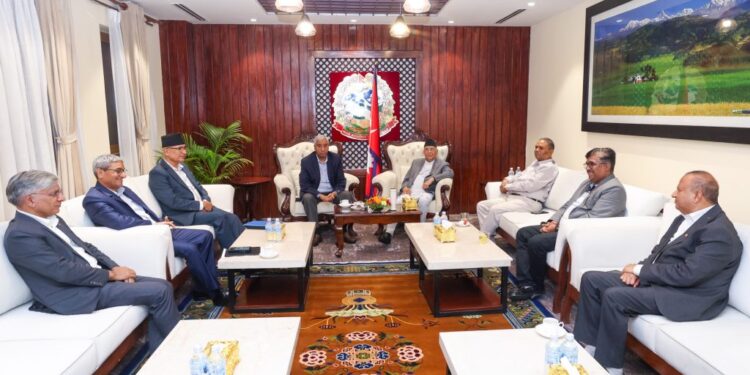In a significant political development, Nepal’s two major parties—Nepali Congress and the CPN-UML—have extended a formal proposal to the Janata Samajbadi Party (JSP) Nepal for a new government partnership. The proposal came during a late-night meeting on Monday at the Prime Minister’s official residence in Baluwatar.
According to Rajkishor Yadav, a member of JSP Nepal’s Central Executive Committee, both Congress and UML expressed readiness to correct past mistakes and urged JSP Nepal to rejoin the coalition.
“They questioned why we had decided to withdraw our support and proposed that we work together again, assuring us that past mistakes would not be repeated,” Yadav told Setopati. “In response, we reminded them that they failed to honor their commitments, excluded us from major coalition decisions, ignored our calls for proportional budget allocation, and continued to marginalize Madhes.”
Yadav stated that JSP Nepal had supported the government selflessly and without bargaining when Congress and UML formed the current coalition. However, the ruling alliance gradually retreated from its promises and systematically sidelined JSP Nepal, prompting the party to reconsider its support.
“If we are to reopen the door for cooperation, we are clear—there must be a comprehensive agreement package,” Yadav emphasized.
He highlighted that the ruling parties had shown indifference toward constitutional amendments and failed to treat JSP Nepal as an equal coalition partner. “Congress and UML would hold internal meetings and merely inform us of their decisions afterward. That’s not how a real partnership works,” Yadav remarked, echoing the party’s stance during the meeting.
Concerns were also raised about governance issues at both the federal and provincial levels. Specifically, Yadav pointed to the recent incident in Madhes Province, where JSP Nepal was bypassed and the provincial Finance Minister presented two separate budget books—an action that further fueled frustration.
“We raised this issue in the meeting. Home Minister Ramesh Lekhak even called the Madhes Province Finance Minister, Sunil Kumar Yadav, to understand the situation. That proves the problem exists,” Yadav explained. “This isn’t how cooperation works. If we’re to work together again, let’s agree on everything as a package.”
Yadav outlined JSP Nepal’s key demands:
- Commitment to correct mistakes at all levels, from federal to provincial
- Inclusion of JSP Nepal’s long-standing demands in the land-related bill under parliamentary review
- Formal recognition and involvement in coalition decisions
- Fair and just budget distribution
- Commitment to social justice and inclusive economic reforms
He clarified that only after establishing a clear foundation of principle-based agreement will JSP Nepal consider joining the government.
“We had overlooked the pain of party divisions and supported the coalition based on trust. There was internal opposition, but we moved forward with hope. Unfortunately, promises were not kept, and that led us to withdraw our support,” said Yadav. “If there is to be any new collaboration, we want a well-defined agreement first.”
Yadav added that Congress and UML appeared positive about the proposal and agreed to form a task force to work toward a common understanding. If agreement is reached on issues like timely economic reforms, fair budget allocation, and social justice, JSP Nepal is open to cooperation, he confirmed.
The meeting was attended by Prime Minister and UML Chairman KP Sharma Oli, Nepali Congress President and Prime Minister Sher Bahadur Deuba, JSP Nepal Chairman Upendra Yadav, Deputy Prime Minister and Finance Minister Bishnu Prasad Paudel, UML General Secretary Shankar Pokharel, Home Minister Ramesh Lekhak, Chief Advisor to the Prime Minister Bishnu Prasad Rimal, and JSP Nepal leader Rajkishor Yadav.

 Podcast
Podcast
















Discussion about this post